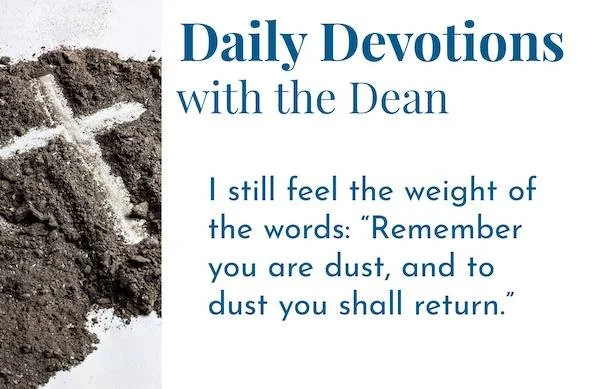Friday • 2/16/2024 •
Friday of Last Epiphany, Year Two
This morning’s Scriptures are: Psalm 31; Ezekiel 18:1–4,25–32; Philippians 4:1–9; John 17:9–19
This morning’s Canticles are: following the OT reading, Canticle 10 (“The Second Song of Isaiah,” Isaiah 55:6–11; BCP, p. 86); following the Epistle reading, Canticle 18 (“A Song to the Lamb,” Revelation 4:11; 5:9–10, 13, BCP, p. 93)
Welcome to Daily Office Devotions, where every Monday through Friday we bring to our lives that day’s Scripture readings, as given in the Book of Common Prayer. I’m Reggie Kidd, and I’m grateful to be with you this Friday in the Last Week of the Season After Epiphany. We are in Year 2 of the Daily Office Lectionary.
Being or Not Being
I once had a co-worker (in a non-church job) who said he was abandoning Christianity. The faith of the Bible was dangerous, he had concluded, because it gave every individual a sense of their own self … their own importance, their own boundaries, their own accountability. He was experimenting with a rival religious system that taught that we all just get absorbed back into “the All … the Great Cosmic Soup.” Somehow, the cash value for him was that he felt no obligation to carry out his supervisor’s instructions. His job didn’t last long.
Sadly, I never had the chance to get to know my former co-worker well enough to find out what weight he was under that was making him want to escape the responsibility of selfhood. All I know is that my conversations with him made me reflect on what a massive thing it is to accept responsibility for my own self. I am the only “me” I have, and I want to steward it well.
It's only been two days since the imposition of ashes on my forehead. I still feel their imprint, and the weight of the words: “Remember that you are dust, and to dust you shall return.” It is a serious thing to be made steward of the “me” that I am for the days allotted to me.
Ezekiel 18 lays down markers on the trail.
“For I have no pleasure in the death of anyone, says the Lord God” — Ezekiel 18:32a. Let’s start at the end. It’s important to know that we deal with a God who has a certain heart, a certain wiring. The God of people’s imagination is either William Pullman’s senescent old man who deserves to be dethroned by younger, fresher, cooler spiritual powers, or he is an insincerely smiling Santa who says he wants your wish list, but who’s really making his own naughty-and-nice list. If that’s who we are dealing with, maybe it is better to be a non-being, just an impersonal part of cosmic soup.
Instead, though, the Bible’s God likens himself to a father who waits longingly for the prodigal child to return, and who grieves over the emotionally constipated child who never dares to rebel but doesn’t really love either (Luke 15). The Bible’s God compares himself to a man who intentionally marries a whore, and when she all too predictably runs off with another man, he pursues her and “allures her” and “speaks tenderly to her” to win her back (Hosea 2:16). Ezekiel says the Bible’s God has set his affections on us, that he has “no delight in the death of” us.
Image: iStock
“Know that all lives are mine; … it is only the person who sins that shall die. … the righteousness of the righteous shall be his own” — Ezekiel 18:4a,c,20b. It is not with an impersonal, faceless mass of humanity that God deals. The Bible calls us “bearers of God’s image,” each of us stamped with his likeness and called to reflect his character out into the world. Each of us distinctly, wonderfully, and uniquely bears that image, stamp, and calling—like it or not. And Ezekiel soberly lays out the stakes for us: glory or shame, approbation or reprobation, relationship or alienation. What my former co-worker was cutting himself off from was the potential satisfaction of the deepest of emotional needs: to know glory, approbation, and relationship — in other words, the joy of loving and being loved.
“Cast away from you all the transgressions that you have committed against me, and get yourselves a new heart and a new spirit!” — Ezekiel 18:31. The Bible also recognizes we have all failed the responsibility of selfhood. We have all squandered our inheritance in a strange land or stayed home thinking we are playing it safe but grudgingly and resentfully. We have all gone whoring after gods who are no gods. We all fully deserve to be returned to the dust from which we came, and to be left there. But the Bible also insists that “a new heart and a new spirit” are only as far from us as one simple (if not easy) prayer: “Lord Jesus, Son of God, have mercy on me, a sinner.” The Lenten season that lies before us is an opportunity to let that prayer sink itself deeper and deeper and deeper into our consciousness.
Collect for Ash Wednesday: Almighty and everlasting God, you hate nothing you have made and forgive the sins of all who are penitent: Create and make in us new and contrite hearts, that we, worthily lamenting our sins and acknowledging our wretchedness, may obtain of you, the God of all mercy, perfect remission and forgiveness; through Jesus Christ our Lord, who lives and reigns with you and the Holy Spirit, one God, for ever and ever. Amen.
Be blessed this day,
Reggie Kidd+



